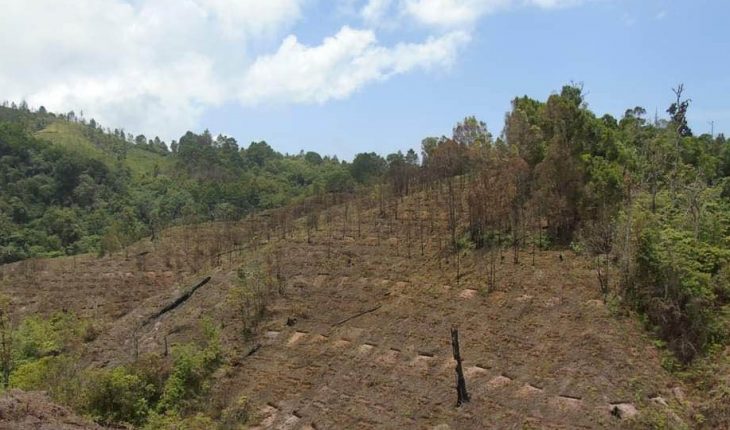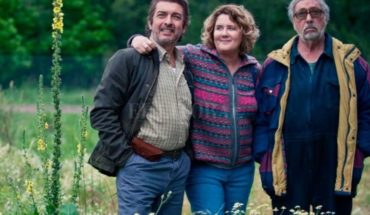Don Rufino was born in a community in Guerrero state, southern Mexico. Growing up in a region where weapons were always present, it made him assume that living in peace was out of the ordinary. Today,” says this 65-year-old man, ” is no longer the same. And as proof of their new reality are the lands that used to have poppy crops and now house trees.
“Who said it is not your duty to be at peace? Who said you had to be killing yourself all the time?” asks Rufino Cázares, of the ejido Cordón Grande, located in the region known as Costa Grande, in Guerrero, and where the inhabitants have formed community companies with which they promote the recovery of their forest resources.
The ejido Cordón Grande, in the municipality of Tecpan de Galeana, covers 16,039 hectares and extends along an area ranging from 1,000 to 2,900 meters above sea level. In this extensive territory, the community has allocated 10,000 hectares to the conservation of the forest.
Ejidaths build trench trenches for water uptake. Photo: Courtesy Ejido Cordón Grande.
When deforestation was not yet coming
In 1955 Rufino was born. At the time, two families in the region were fighting and trying to solve their problems using weapons. Cordón Grande was left by both sides as they launched their attacks: “It was a revolt of the hot Tierra region against the Coast, surname versus surname,” Rufino tells of that episode that, like all the important passages in Cordón Grande’s history, is transmitted through orality.
Mr. Rufino’s earliest memories of Cordón Grande are when the community was not yet ejido, when the water in the stream ran among the trees, when wooded sites abounded, agriculture was practiced for self-consumption and deforestation did not yet exist. This one came later. “We didn’t worry about the forest going to end,” he says.
As a teenager, she learned of the first efforts to turn her community into ejido, which was completed in 1996. In those times, the “grips” (confrontations) in Cordón Grande and in the surrounding ejidos were frequent: El Balcón, Cuatro Cruces, Fresnos de Puerto Rico, La Trinidad, Platanillo, Pie de la Cuesta and Tierras Blancas.
“Grips” are conflicts that can last for years and, according to Don Rufino, are the stones in the way for the ejids to advance because they are synonymous with disunity.
The secretary of the ejido Cordón Grande, Nansedalia Ramírez – the first woman to hold a community position in the history of the ejido Cordón Grande – considers that the lack of social cohesion in the region is what opens the door not only to violence, but also to the uncontrolled plundering of natural resources.
Uncontrolled felling
When Don Rufino became an ejidate, in the late 1960s, his work was basically agriculture. Soon, in his community he began logging the forests, in order to complement the low incomes of the peasants. The forestry company Vicente Guerrero – parastatal of the government of Guerrero that was later called Guerrero Forest Industries – was the one that bought its trees.
In Cordón Grande it is remembered that forest engineers arrived “to point out the trees that had to be thrown away” and nothing else. The community received no advice to drive sustainable forest management. Even, Don Rufino now says, “We never knew if they were really engineers.”
The villagers, Rufino explains, were informed that when they had knowledge of reforestation and learned how to use the machinery, the parastatal would retire and let the community take over the management of their forests.
“It’s been over 20 years and according to them we never learned to operate the machinery. They left with everything and left the pelon forests,” Rufino recalls.
For more than three decades, a good part of Guerrero’s forests “were immersed in an inefficient, corrupt and voracious scheme by concessionaires, both parastatal and private, that left no learning, infrastructure or capabilities in ejidos and communities,” explains Arturo García, coordinator of the MeF Forests Collective and who has worked with forest communities in the state.
Recovering forests
The creation of the Union of Forestry and Agricultural Ejidos General Hermenegildo Galeana, in 1988 (formally constituted in 2016), allowed communities such as Cordón Grande to begin exploring a new path for themselves and their forests, without having to rely on the parastatal company.
The study Forest social enterprises in Mexico, published in 2018 by CMexican Civil Onsejo for Sustainable Forestry (CCMSS), identifies the main challenges faced by communities that embark on the path of forest management in various states of the country: the lag in infrastructure, a “suffocating” regulatory framework, the illegal trafficking of timber “that creates almost impossible competition”, among others.
Rufino explains that when the ejido stopped selling his trees to the parastatal company, the community was divided. So one of the first steps they had to take was to organize and not fight, so that projects were concreted and shielded so that organized crime would not go in to plunder its resources.
Cordón Grande already has a nursery where they produce pines and coffee plants. Photo: Courtesy Ejido Cordón Grande.
Rufino, who as a child learned that problems can occur “between surnames”, says that a way to end internal conflicts was by using “a rare half-mechanism” that consisted in identifying, in each family, a person who could cause problems.
Each family had an obligation to commit that person would not cause conflict. They had to subdue it. At the time, “every family had a madman and everyone had a gun and it wasn’t hard to have a problem.” They also agreed that the ejidal meetings had to be reached calmly and unarmed. If not, it was better not to show up.
Cordón Grande began the walk towards peace and recovery of its forest. But it was not a straight path, especially since the economic benefits would not be immediate. Instead, those of poppy cultivation, yes.
“The poppy fed us for decades. It was easy money,” says Rufino, who was a poppy sower.
The expansion of the poppy
66.5% of the guerrilla population is poor and 26.8% live in extreme poverty, according to the latest measurement by the National Council for the Evaluation of Social Development Policy (Coneval), published in 2018. The municipality of Tecpan de Galeana has health, education and housing deficiencies above the average levels of Guerrero. Lack of access to food is 39.6%, equivalent to 25,824 people.
The fragile social situation of places such as the ejido Cordón Grande has been sustained in part by the cultivation of the poppy, a plant from which the opium gum used to make the heroin is extracted and which, in the state of Guerrero, began to be sown in the early 1970s.
The 2017-2018 Poppy Crop Monitoring – conducted by the United Nations, with information from the Mexican government – placed Guerrero among the main producing states of that crop, along with Nayarit and the region of the so-called Golden Triangle that includes territories of Chihuahua, Sinaloa and Durango.
The United Nations study estimated that in these three regions there are a total of 28,000 hectares planted with poppy, i.e. 2600 hectares less than the previous period.
The study notes that during the period 2017-2018 poppy cultivation was reduced by 9% compared to 2016-2017.
The decrease in poppy planting in the country, which shows the UN study, coincides with the information held in Cordón Grande, where the cultivation of the plant began to decrease two years ago, when there was a drop in the price of opium gum.
“The poppy is too complicated,” nansedalia Ramirez admits. “At first,” he explains, “the way to deal with it (in the community) was more confrontational. It is a culture of many years rooted by poverty. Then we realized that the way was not to confront.”
This is how they decided to identify economic opportunities and explain that if they were committed to strengthening their community forestry enterprises, the ejido could recover their forests and have productive options. “And we’re making it,” Ramirez says.
In Guerrero, where it is still possible to find important forested areas, “the evolution of forestry activity is marked by successive state governments linked to historical cacicazgos, the military presence at various stages, the diversity of armed groups and the coexistence with the production of energy,” explains Arturo García, of the MeF Forests Collective.
Ejidaths have eight ponds where they produce tilapia. Photo: Courtesy Ejido Cordón Grande.
Violence that tops down community forest management
Cordón Grande has also had to deal with organized crime. The weapons that were always there, those used in the confrontations between surnames, became archaic in the face of high-power weaponry handled by organized crime groups, which control drug trafficking and are present in various states of the country, between them Guerrero.
“People always lived with the poppy, but (the rubber) was sold to someone and that’s it. Now the big organized crime groups have arrived. The real focus that Guerrero controls is organized crime, which is not in the interest of community development,” says Arturo García.
The presence of the crime, Garcia says, has discouraged community forest management and the region “has begun to decline.”
And a sample is what happened in the ejido El Balcón which, for several years, was a national reference when it was talked about community forest management and today suffers from the illegal logging that controls organized crime. “That discouraged a lot,” Garcia says, “because El Balcón was the role model.”
The biologist Salvador Anta, current member of the CCMSS and the organization Politics and Environmental Legislation (POLEA), was a delegate in Guerrero of the National Forestry Commission (Conafor) in 2007-2009. He points out that the community forest management debacle in this Region of Guerrero began 10 years ago. This has led to a decrease in public resources invested in reforestation programmes in the region.
The biologist Anta even has testimonies from Conafor workers who had to stop doing fieldwork in the area, due to conditions of insecurity.
“Organized crime penetrated more and more in every region of the state. The ejidos had to generate other ways of working or conflicting with organized crime. Institutions ceased to have resources and stopped working because of how dangerous this region is,” explains Anta.
Groups that control drug trafficking in the region also began to manage forestry activity. Anta says that the communities are extorted (charging them “floor right”) or even these mafias are directly responsible for extracting the wood from the forest and marketing it.
Building barriers to change history
In the region, Cordón Grande has been one of the few forest ejidos that has managed to have a barrier against these organized crime groups.
“When an ejido is united is when armed groups cannot enter. If there is division, they can intervene,” says Nansedalia Ramirez.
Nansedalia Ramírez and Rufino Cázares participated in the negotiations that helped prevent the same thing from happening in Cordón Grande as in El Balcón.
The devaluation of the price of poppy caused sowers of that plant to have two options: to engage in illegal and immoderate logging, to sell wood to organized crime, or to join a program dedicated to the recovery of areas degraded by poppy and livestock financed by the Conafor.
Rufino Cázares lay down his poppies and sowed pine. Its new forest plantation is two meters high. Other ejidarians opted for illegal logging. The unit that had been achieved was breaking.
“We held meetings day and night. We felt threatened and we were afraid. There was a rupture of the social tissue in the ejido. We think, if we don’t stop them, it’s something we’re never going to get up of,” says Nansedalia Ramirez.
An entourage was planted on the road where the wood trucks were coming down. The other ejidos were expectant. If Cordón Grande fell, chaos would come.
As Rufino Cázares reminds him: “It was difficult, we had to talk to the groups (organized crime). We found a mediator and got them to understand. This was already in the last assembly we had.”
Cordón Grande, and its 175 ejidatarios, today have the following forestry companies functioning: a sawmill where packaging and broomstict are manufactured; an ecotourism center in the upper parts of the ejido; an apiary where they produce honey to market; a tilapia production centre with eight ponds with a total capacity of nine thousand fish; a forest nursery that produces pine and cedar to reforest degraded areas.
In the forest nursery they also produce coffee plants that give away to the 700 families of the ejido to have their own farms. In addition, in its forests are part of a corridor where the jaguar lives; estimate that there are 12 specimens. The ejido is now in the process of certifying 8573 hectares for the conservation of the feline.
Mr. Rufino Cázares spent a lot of time “waking up mad” (annoyed) because that’s how we’ve wanted to grow as people. So: nothing grateful for life. “We are a mass that governments have been working on with such bad services. Now we know that you can live in peace.”
What we do in Animal Político requires professional journalists, teamwork, dialogue with readers and something very important: independence. You can help us keep going. Be part of the team.
Subscribe to Animal Politics, receive benefits and applyoya free journalism, #YoSoyAnimal
translated from Spanish: revive forests where poppies used to grow
June 28, 2020 |





